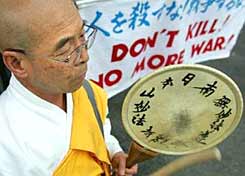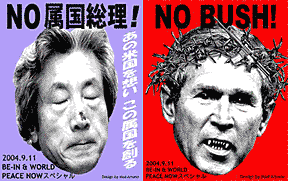Japanese Politics, Iraq, & School Textbooks

Politics in Asia rose in intensity this week when Koizumi’s government approved right-wing school textbooks, which whitewash some of the most atrocious actions of the wartime era Japanese imperialists, and fuel current disputes with their Korean and Chinese neighbors. The books, which have been supported by the far-right Japanese Society for History Textbook Reform, downplay events such as the massacre at Nanking, and the sexual slavery of women in areas that the Japanese occupied, and insist that their military actions were justified. When the textbook was first approved by the Ministry of Education in 2001, hardly any local school board would adopt it. Now, a revised edition of the book, just as erroneous, has brought up the issues again, and prompted protests and diplomatic troubles in Asia.
The battle over school textbooks is just another step in the rightward march of the Koizumi government in the past couple of years. Koizumi is the first prime minister to annually visit the Yasukuni Shrine, where in addition to WW2 war dead, several of the highest ranking war criminals of the militaristic regime are interred. And in perhaps the most shocking move in Japan’s postwar period, Koizumi altered a part of the country’s pacifist constitution to allow Japanese troops to support the Bush administration’s war efforts in Afghanistan and Iraq. It was of course, the United States which helped shape the Japanese constitution, with the intention of keeping the Japanese military forever on their home shores so that imperialism could never again rear its ugly head.

These outrageous moves have ignited the anger of not only many Japanese, but also that of Japan’s close neighbors who harbor deep memories of Japan’s fairly recent imperialistic past. For many of Japan’s younger generations, Koizumi’s actions are inconceivable… akin to say, if the German prime minister paid “respects” at the tombs of Nazi war criminals. And Koizumi’s lending support to Bush’s war has sparked an anti-war movement the likes of which Japan has not seen since the late 1960s. (Visit the World Peace Now! Website in Japanese or English) For Japan’s close neighbors, Koizumi’s escalating actions are causing not just suspicion but outright fear, that this is the dawn of a new era of Japanese imperialism. So much so, that Japan’s current bid for a permanent seat on the UN security council has met with mass protests across China and Korea, bitter diplomatic fights, and the signatures of millions to online petitions. We here at the Black Moon feel it is vitally important for anyone who is interested in Japanese culture, to pay close attention to current political issues in Asia. We hope you’ll continue to visit not only our site for updates as they develop, but investigate these current topics on your own. (posted by J.)


<< Home